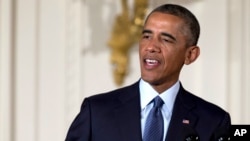President Barack Obama and Israeli Prime Minister Benjamin Netanyahu are to meet next week, as the White House denies any deal with Iran regarding the fight against Islamic State (IS) militants and talks over Tehran’s nuclear program. The meeting comes as Palestinian Authority President Mahmoud Abbas presses for a U.N. resolution setting a timetable for Israeli withdrawal from the West Bank.
The White House said Monday Obama and Netanyahu will hold their first talks in seven months on October 1 at the White House. A National Security Council spokeswoman said the meeting will likely highlight U.S.-Israeli divisions over nuclear talks with Iran.
Officials of the P5+1 group of nations (the United States, Russia, China, Britain, France, the United Kingdom and Germany) began the latest round of nuclear talks with Iran in New York ahead of a November 24 deadline for a longer-term agreement. An interim deal last year resulted in reduced Western sanctions in exchange for a freeze on part of Iran’s nuclear program.
Countering Islamic State group
Sunday, Netanyahu described reports of an Iranian offer of support of the U.S.-led fight against Islamic State militants in exchange for an easing of sanctions as “absurd”. He said Iran is fighting IS for control of the Islamic world. Randolph-Macon College regional analyst Michael Fischbach said this remains a contentious issue between the two countries.
"Clearly, under the Obama Administration, the United States has been taking a different attitude toward Iran, the entire nuclear question, and that’s one of the sore points between Israel and the United States, has been a fairly consistent and remarkable public criticism by Netanyahu, talking to Congress, talking to the Israel lobby in the United States. For Israel, not the Palestinians, but Iran remains the main strategic threat," said Fischbach.
On Monday, White House spokesman Josh Earnest said ongoing talks on resolving the international community’s concerns about Iran’s nuclear program are “entirely separate” from the overlapping interests Tehran has about the fight against IS militants.
"It is not in the interests of the Iranian regime for this extremist organization to be wreaking havoc on its doorstep. So, like the international community, the Iranians are understandably concerned about the gains ISIL has made in Iraq, and they have indicated that they are ready to fight ISIL. But, the United States will not coordinate any of our military activities with the Iranians. And, the United States will not be involved in sharing intelligence with the Iranians. And, the United States will not be in a position of trading aspects of Iran’s nuclear program to secure commitments to take on ISIL. These two issues are entirely separate," said Earnest.
Earnest acknowledged Sunday’s meeting between U.S. Secretary of State John Kerry and his Iranian counterpart, Foreign Minister Mohammad Javad Zarif, in New York. U.S. officials said the two talked about the fight against IS, but Kerry insisted there will be no military cooperation with Iran, although he didn’t rule out some kind of Iranian contribution.
Indirect cooperation likely
Last week, Iran’s supreme leader, Ayatollah Ali Khamenei, rejected a U.S. offer of cooperation against IS. However, RAND Corporation Iran analyst Dalia Dassa Kaye thinks indirect cooperation is likely.
"There’s understanding on both the Iranian and American side that, in this case, the U.S. and the Iranians have a common enemy, the Islamic States. There will be indirect cooperation, which they don’t even admit to obviously through the Iraqi government, which the Iranians support, as does the United States. There’s going to be coordination between the United States and Iraqi government and between Iran and the Iraqi government. So, indirectly, there will be some tacit type of coordination going on,” said Kaye.
Kaye said any argument for more direct cooperation will be difficult to sustain as the U.S.-led coalition expands air strikes to Syria, an Iranian ally.
Palestinian statehood
Israeli media reports President Obama and Prime Minister Netanyahu will discuss expected unilateral moves by Palestinian Authority President Mahmoud Abbas to gain international recognition of a Palestinian state. He is expected to seek a U.N. Security Council resolution affirming the borders of a future state based on the pre-1967 war lines and a three-year timetable for Israeli withdrawal from the West Bank.
"This week, I will propose to the United Nations a new timetable for peace talks. The key is to agree on a map to delineate a border of each country. I say today to Prime Minister Netanyahu, end the occupation, and make peace," said Abbas during remarks at New York’s Cooper Union College.
University of San Francisco Middle East analyst Stephen Zunes doubts Abbas’ effort will receive U.S. backing.
"The United States has seen itself for a number of administrations as the arbiter in the [Mideast] conflict. They have generally tried under both Republican and Democratic administrations to generally marginalize the United Nations and have insisted that whatever progress is made between the two parties under U.S. arbitration. There’s no question, while not unsympathetic with the Palestinian position per se, will take a very hard line against the Palestinians taking this to the U.N.," said Zunes.
Should the United States veto such a Security Council resolution, Palestinian officials say they will push ahead with plans to join the International Criminal Court, which could open proceedings against Israel, sign international treaties and join organizations. U.S.-brokered Israeli-Palestinian negotiations collapsed in April after Abbas took steps to form a unity government with the Islamist group Hamas, which dominates Gaza.




